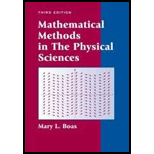
Show that if A and B are matrices which don’t commute, then
Want to see the full answer?
Check out a sample textbook solution
Chapter 3 Solutions
Mathematical Methods in the Physical Sciences
Additional Math Textbook Solutions
Precalculus: Mathematics for Calculus (Standalone Book)
Algebra and Trigonometry (6th Edition)
Elementary Statistics (13th Edition)
Elementary Statistics
Basic Business Statistics, Student Value Edition
Probability And Statistical Inference (10th Edition)
- Obtain the linear equation for trend for time series with St² = 140, Ey = 16.91 and Σty= 62.02, m n = 7arrow_forward1: Kevin Williams earns a weekly wage of $740. During the most recent week, he worked 42 hours. Regular Wage Rate = $ 18.50 Overtime Wage Rate = $ 27.75 2: Charles Joyner earns a biweekly wage of $2,720. During the most recent week, he worked 45 hours. Regular Wage Rate = $ Overtime Wage Rate = $_ 34.00 51.00 3: Julio Valdez earns an annual salary of $81,000. During the most recent week, he worked 44 hours. Regular Wage Rate = $ Overtime Wage Rate = $ 38.94 58.41 4: Bridget Stein earns a monthly salary of $6,200. During the most recent week, she worked 56 hours. Regular Wage Rate = $ 27.50 Overtime Wage Rate = $ 41.25 5: Betsy Cranston earns a semimonthly salary of $2,200. During the most recent week, she worked 49 hours. Regular Wage Rate = $ Overtime Wage Rate = $_ 1,100.00 41.25arrow_forwardIf you are using chatgpt leave it plz Already got wrong chatgpt answer .arrow_forward
- Let g(z) = z-i z+i' (a) Evaluate g(i) and g(1). (b) Evaluate the limits lim g(z), and lim g(z). 2-12 (c) Find the image of the real axis under g. (d) Find the image of the upper half plane {z: Iz > 0} under the function g.arrow_forwardk (i) Evaluate k=7 k=0 [Hint: geometric series + De Moivre] (ii) Find an upper bound for the expression 1 +2x+2 where z lies on the circle || z|| = R with R > 10. [Hint: Use Cauchy-Schwarz]arrow_forward4. 5. 6. Prove that p (gp) is a tautology using the laws of propositional logic. Prove that p((pVq) → q) is a tautology using the laws of propositional logic. Let us say a natural number n is ok if there are two natural numbers whose sum is n and whose product is n. (Convention: the natural numbers consist of 0, 1, 2,...) (a) Give a logical expression that means "n is ok". (b) Show that 0 and 4 are both ok. (c) Give a logical expression that means "every natural number is ok". (d) Give a logical expression that means "it is not the case that every number is ok". Push the negations into the expression as far as possible.arrow_forward
- 7. Let E(x, y) be a two-variable predicate meaning "x likes to eat y", where the domain of x is people and the domain of y is foods. Write logical expressions that represent the following English propositions: (a) Alice doesn't like to eat pizza. (b) Everybody likes to eat at least one food. (c) Every student likes to eat at least one food other than pizza. (d) Everyone other than Alice likes to eat at least two different foods. (e) There are two different people that like to eat the same food.arrow_forward21. Determine for which values of m the function (x) = x™ is a solution to the given equation. a. 3x2 d²y dx² b. x2 d²y +11x dy - 3y = 0 dx dy dx2 x dx 5y = 0arrow_forwardhelp me solve thisarrow_forward
- Algebra & Trigonometry with Analytic GeometryAlgebraISBN:9781133382119Author:SwokowskiPublisher:Cengage
 Linear Algebra: A Modern IntroductionAlgebraISBN:9781285463247Author:David PoolePublisher:Cengage Learning
Linear Algebra: A Modern IntroductionAlgebraISBN:9781285463247Author:David PoolePublisher:Cengage Learning Elementary Linear Algebra (MindTap Course List)AlgebraISBN:9781305658004Author:Ron LarsonPublisher:Cengage Learning
Elementary Linear Algebra (MindTap Course List)AlgebraISBN:9781305658004Author:Ron LarsonPublisher:Cengage Learning


